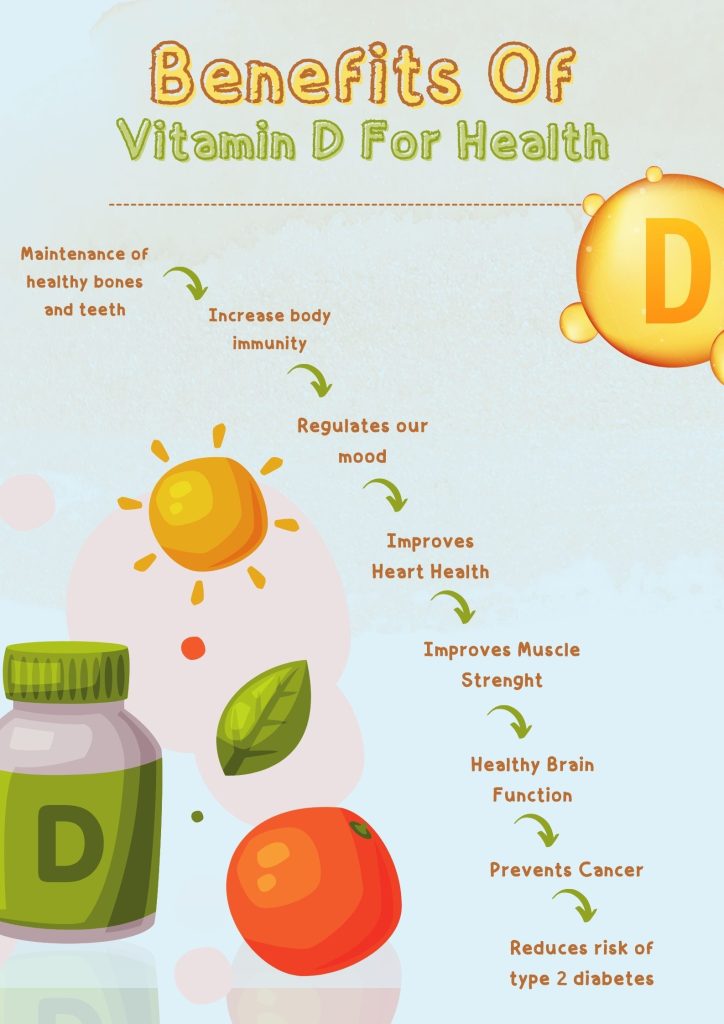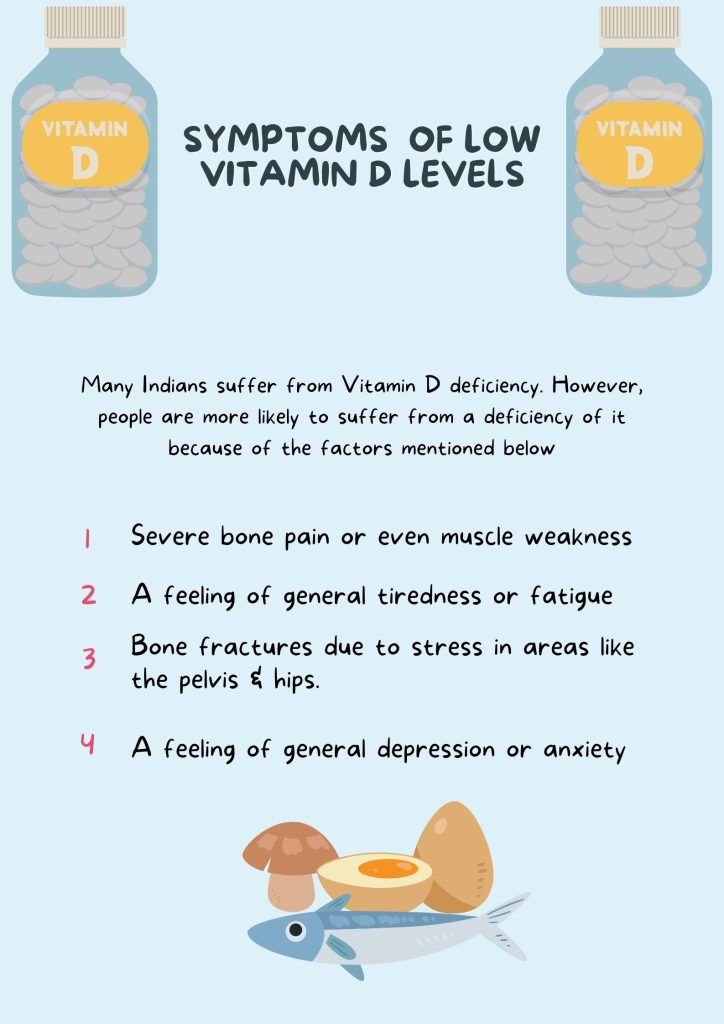
Blog Highlight: Explore the top 10 Health Benefits of Vitamin D, from boosting immunity to bone health. Learn how this essential nutrient can elevate your well-being.
An essential nutrient for our human body is Vitamin D. And it's also called the sunshine vitamin as sunlight can produce Vitamin D in the human body.
Vitamin D also plays major functions in the human body, which includes the absorption of phosphorous and calcium, and also helps strengthen our immune system.
However, in spite of the essential nature of this vitamin, there is a widespread deficiency of Vitamin D in India, with data from The Times Of India suggesting that nearly 76% of Indians lack adequate levels of Vitamin D.
This stems from a lack of knowledge about the important functions this vitamin plays in our body and the food sources that are rich in it and also easily available.
This is why, in this blog, we shall discuss top 10 health benefits of Vitamin D, along with daily requirements and the best food items that are naturally rich in Vitamin D. So, without any further ado, let's jump right in.
Vitamin D is a hormone that is also very chemically similar to estrogen, progesterone, and even testosterone.
Vitamin D is soluble in fats and is present in mostly two types in the human body.

Let’s look at their functions and sources in brief.
Vitamin D2 helps us regulate the absorption of calcium in our body and also improves our bone density and health. It is found in plant-based food items like plant-based milk, orange juice, and even cereals.
Vitamin D3 is the more popular version of Vitamin D. It is synthesized in our body when we are exposed to natural sunlight. It also supports our bone health and calcium like Vitamin D2, but plays a broader role in our health, more of which we shall discuss later.
A good source of Vitamin D3 is sunlight. It is also found in other food items like Cod liver oil, egg yolks, beef liver, and also fatty fish.
More of this article will be based on Vitamin D3, as it plays a broader and more specific role in our body and is also superior to its counterpart, D2, when it comes to maintaining optimal levels of Vitamin D in our body.
There are a few food items that are naturally rich in Vitamin D. Some of the best sources for this essential nutrient are fatty fish and fish liver oil.
Smaller amounts of it are also present in cheese, egg yolks and even beef liver. Trace amounts of it can also be present in certain types of mushrooms when they are exposed to UV light.

The human body is also capable of producing its own Vitamin D when it is exposed to sunlight. When our human skin is exposed directly to sunlight, a chemical reaction occurs. A steroid known as 7-dehydrocholesterol gets broken by the UV rays of the sun, which then converts into Vitamin D3.
As this type of Vitamin D is produced naturally, there are several benefits of Vitamin D from the sun.
Thus, sunlight exposure is the best source of Vitamin D for our body.
Now, let’s look at the top 10 benefits of Vitamin D.
Vitamin D can play a crucial role to keep our body healthy. Vitamin D deficiency can cause serious health implications.
The major health benefits of Vitamin D in our body are discussed below.

A major function of Vitamin D is the role it plays in building our bones. This is due to the fact that it can help in the absorption of calcium and phosphorous in our body, which are both necessary for the healthy mineralization of bones.
Long-term deficiency of Vitamin D can result in osteoporosis, which results in muscular weakness and poor bone density.
According to research, Vitamin D can play a major role in strengthening our immune system. There is also a connection between the lack of Vitamin D and autoimmune diseases like asthma, arthritis, diabetes, etc. Studies at the cellular level have shown that Vitamin D strengthens the immune capacities of human cells.
Vitamin D does impact neurotransmitters in the brain, including serotonin, which affects our mood. Vitamin D contributes to a balanced emotional state and can help treat depression.
Sufficient levels are associated with a lower risk of mood-related disorders like depression and might help- you feel more uplifted.
Vitamin D also positively impacts our heart. It helps regulate blood pressure by relaxing blood vessels and reducing tension in the arteries.
This leads to smoother blood flow. Moreover, it has anti-inflammatory effects that can help prevent heart problems.
Our muscles rely on Vitamin D to function optimally. It assists in muscle contraction and strength maintenance in our body. This is similar to providing the right kind of fuel for our car's engine to run smoothly.
Having sufficient Vitamin D levels can help prevent muscle weakness, which is important for our overall mobility and physical performance.
Vitamin D can act as a neurosteroid. Thus, it is involved in brain function through its interaction with neurotransmitters and other nerve growth factors. By supporting our cognitive abilities and strengthening memory, it contributes to better overall brain health.
Vitamin D has been shown to have potential anti-cancer properties. It influences cell growth and division, making it harder for cancer cells to form and multiply.
Research also has found that cancer patients, when treated with Vitamin D, had a lesser chance of mortalities.
Reseach has shown that Vitamin D can boost beta cell function, reduce inflammation, and also increase insulin sensitivity. These are all beneficial when it comes to reducing the risk of type 2 diabetes.
Vitamin D has been shown to create new hair follicles on the human scalp. People with various types and stages of hair loss were also found to have low levels of Vitamin D.
Moreover, Vitamin D deficiency has been found to have a link with alopecia areata, which is an autoimmune condition causing bald patches on the scalp.
Vitamin D is also responsible for numerous anti-inflammatory functions that can treat certain types of skin conditions like acne, psoriasis, skin dryness, vitiligo, and even eczema.
If you don't get enough Vitamin D, you can get wrinkles and also appear aged. In short vitamin d helps you to get that healthy glowing skin which you always wanted.
Thus, you can find Vitamin D in several cosmetics, and it is also sometimes prescribed by dermatologists as a supplement, as there are benefits of Vitamin D supplements for the skin.
Now that you know the health benefits of Vitamin D, let’s look at the symptoms of low Vitamin D levels.
Many Indians suffer from Vitamin D deficiency. However, people are more likely to suffer from a deficiency of it because of the factors mentioned below:

As such, it is wise to obtain adequate amounts of Vitamin D through both your diet and exposure to sunlight.
Key Vitamins to get rid of Tiredness - Silky Mahajan
Vitamin D supplementation may provide relief in these circumstances. Supplements have specific advantages for individuals living in low sunlight environments who do not get enough Vitamin D through diet alone.If you are facing any of the above symptoms, consult a dietitian/nutritionist asap.
The recommended dose of Vitamin DE for healthy individuals is 4,000 IU a day.
However, most people have a general question: "What happens if you take Vitamin D every day?
Excessive consumption of Vitamin D can cause a condition called hypercalcemia. This is characterized by high levels of blood calcium in our bodies. This can lead to the calcification of our bones, harden our blood vessels, and cause injuries to our lungs, heart, and kidneys.
Vitamin D is an essential nutrient essential to our body's well-being and should be included as part of any healthy diet to ensure optimal levels in our bodies naturally. A deficiency of it can cause serious health implications; thus, it's wise to consume a diet high in this vitamin for the best results.
However, if you are planning on supplementing with Vitamin D, then it is advisable to consult with a healthcare professional to avoid Vitamin D toxicity.
In case of any related query to nutrition or weight loss book an online appointment with Dt. Silky Mahajan.
